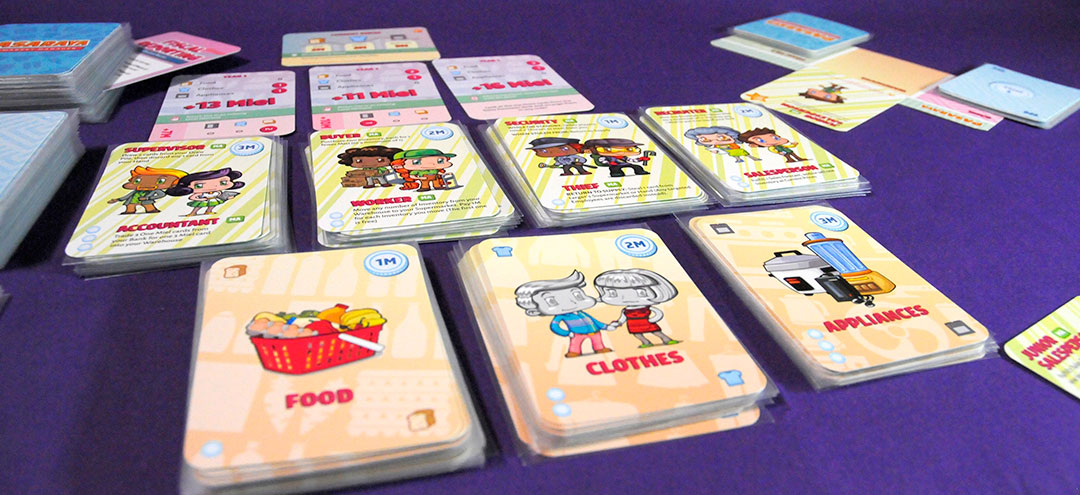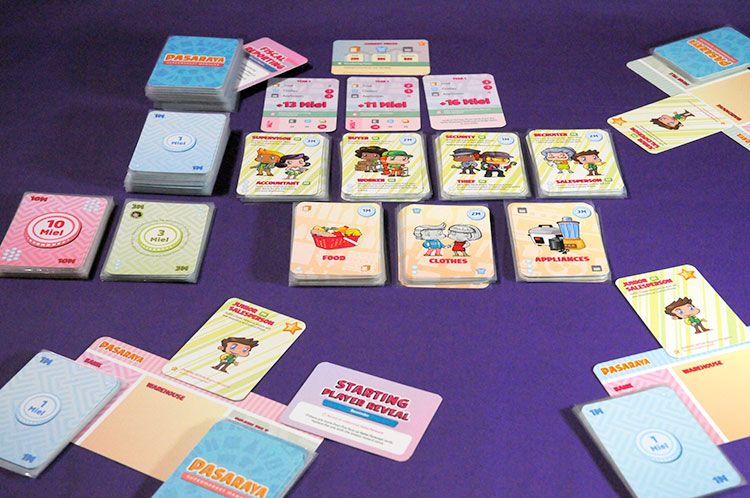
 I often discover games to play by following reviewers I trust on YouTube and on Instagram. Pasaraya was a game that received praise from Girls’ Game Shelf, and I found out that Wong, who was in the movie Crazy Rich Asians and is also a game journalist, was involved with the project. Consequently, I had to check it out and I trusted them enough to just outright purchase a copy straight from the publisher, Boxfox Games.
I often discover games to play by following reviewers I trust on YouTube and on Instagram. Pasaraya was a game that received praise from Girls’ Game Shelf, and I found out that Wong, who was in the movie Crazy Rich Asians and is also a game journalist, was involved with the project. Consequently, I had to check it out and I trusted them enough to just outright purchase a copy straight from the publisher, Boxfox Games.
Pasaraya is an economic card game for 1-4 players that takes about 60-90 minutes to play. The best experience is with three players for a reasonable amount of competition and minimization of downtime.
Gameplay Overview:
In Pasaraya, you act as a supermarket manager and take as many actions as you deem necessary to run your business properly. This includes managing inventory, managing employees, cash (or “miel”) flow, and meeting market demands within a two year period. Not to worry, this game doesn’t take two real-world years! Once you perform your actions, you’ll discard any unused cards in your hand and draw a new hand in preparation for your next turn. New sales forecasts, or orders, are revealed and remain in demand until the demand is met.

The game also comes with more advanced modes that makes the supermarket manager lose several passive abilities. In other words, you’re at the mercy of the employees you hire or don’t hire. And, in case you don’t have enough players to reach that sweet spot of 3, the game does come with an AI deck to shake things up.
Fulfilling sales forecasts has the added benefit of being able to manipulate the market or start one-time game conditions that affect other players. This includes flooding other players’ warehouses with stuff they likely don’t want. Considering this is primarily a hand management game with deck building elements, messing up other players’ draws with “take that” is a good way to slow them down a little. Note, though, it’s not that hard to bounce back in this game so this will only buy you a fraction of time.
The fiscal reporting card is located somewhere towards the end of the Sales Forecasts Deck. When that card is revealed, all players get the same number of turns to resolve. After all assets are liquidated – with the exception of employees –the winner is the player with the highest total.

Game Experience:
If you don’t enjoy hand management and deck building mechanics, this is not the game for you. I normally don’t like deck builders because I’m terrible at optimizing thinning aspects. Yet in this game, since you are continually using up resources to fulfill sales forecasts, there isn’t an intentional thinning aspect that isn’t already happening.

However, if you enjoy the concept of balancing acquisition of goods, maintaining a lean team of employees, and understand what cash you need available on hand, this is the game for you. There have been a few games where I was too inventory heavy without enough employees to stock the shelves, and games where I was employee heavy without anything for them to do. This makes for great stories in the future.
However, when you do play the correct way – which I eventually did and still loved it – it’s just as fun a game.
I think the one criticism I have about this game is the ability to manipulate the market in such a way that you can reduce demand. Does this mean you simply convince the public to not want it? It’s unclear. I could understand if you would tell the public market that they wanted *more* of what they already were requesting but not less. Yet, unlike in other games where you play more of the holistic, invisible hand of the market or business dynamic, you feel much more on the floor and ground level.

Final Thoughts:
Pasaraya is meant to give you an engaging experience in managing a supermarket, balancing inventory with market demand, and anticipating sales forecasts. Actions are determined by your hand, and your hand is populated by the deck you build over the course of the game.
Final Score: 3.5 Stars – Live your supermarket management dreams by meeting the economic concepts of supply and demand, and best your competition with wit, speed and even a few dirty tricks.
 Hits:
Hits:
• Simulates aspects of supermarket management.
• Advanced modes keep the game interesting.
• Theme is present in all actions.
Misses:
• Take that can slow the game down.





















